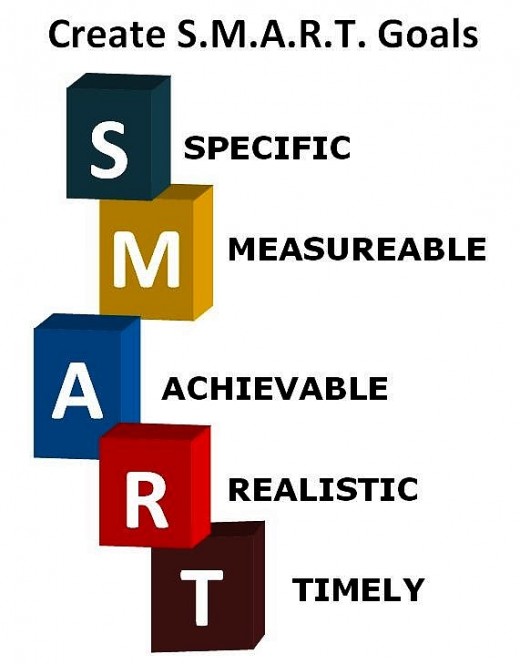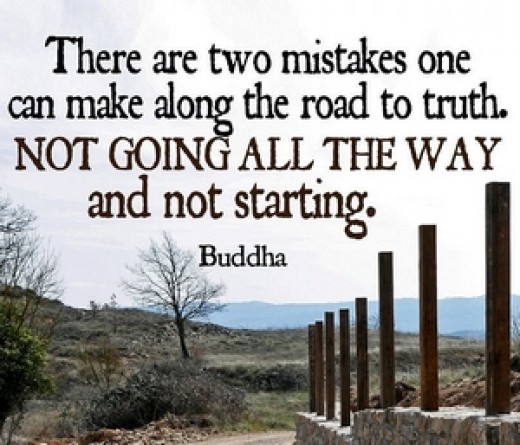How to Improve your Willpower to Reach Your Goals and Keep Your Resolutions
Whatever your objective - to lose weight, to exercise more, to save money, to improve your relationships, you will be ten times more likely to make changes in your life if you made new year resolutions than if you made none. Research has shown that if you can maintain your resolve and will power until the end of January, you will be more likely to succeed. By the end of January, about 30% of people will have broken their new year's resolutions, and by July more than 60% will have lapsed.
The reason many people fail to reach their goals in life or to make personal changes is that they have no real strategy for success. They don't understand willpower and how hard it is to resist temptations and maintain self-discipline. Willpower is essentially a mental muscle that need to be trained, stretched, supported and given a work-out so that you can resist temptations and achieve your goals. This article discusses several strategies for boosting your willpower to keep your resolutions and achieve your goals.

What is willpower
It is defined as the 'trait of resolutely controlling your own behaviour'. Willpower is the self discipline to sacrifice short term benefit and gratification for long term good and benefit. This introduces the concepts of self discipline, self control, self mastery and the conflict between short term and long term benefits.
Certain physical and mental forces can weaken, or strengthen, our self-control and willpower. If your goal is to lose 10 pounds or 5 kilograms by your next birthday you will need to control your craving and binges on chocolate and fast foods. You will need to resist the temptation to grab and eat the chocolate bar in the fridge. Or you will need to get rid of chocolate in the fridge and elsewhere in the house and learn to cope with your cravings.
Basically, willpower is what keeps you on track, despite desires or temptations to do things contrary to your long-term goals and core values.
Willpower is poorly understood and everyone has an inflated and unrealistic belief in its strength and their powers of self control. The reality is that our willpower is weak, easily by-pass, vulnerable, prone to trickery, easily exhausted and gives up easily.
'What the heck' I've eaten one piece of chocolate, I may as well eat the whole block or box. One little chink, a little leak in the dam, and we quickly run out of fingers and the whole dam bursts.
The stronger your willpower, the lower the risk that you will fail. Willpower is what keeps you on the narrow pathway leading to your goal despite all the obstacles, temptations, resistances and weaknesses that will appear along the way. Willpower is what keeps us on the The Yellow Brick Road to the Emerald City. But how do you boost, strengthen and support you vulnerable willpower?
Various research shows that you can strengthen your self-control through practice. By testing yourself on small tasks you can strengthen your willpower for bigger goals, and learn to control temptations and better understanding how to be successful.
So what are some of the key features of willpower and how can it be improved and strengthened:
Willpower is limited and can be depleted - Research has shown that exerting willpower actually lowers your blood glucose levels. Also when you are tired your willpower is weakened. The term 'Ego Depletion' refers to the idea that self-control and other mental processes that require focused conscious effort rely on energy that can be used up. However despite this, it is also true that willpower is in your head - mind over matter. If people believe that willpower is limited and cannot be expanded or controlled, their willpower will be easily depleted. Believing that willpower can be enhanced and is strong, helps you overcome any sense of limitation. Each time you resist one temptation, you are better prepared to resist the next one. This helps avoid the depletion.
- People who think that willpower is limited, look for signs of fatigue. When they detect fatigue, they slack off.
- People who believe that willpower can be enhanced, the signs of fatigue makes them dig deeper and harden their resolve.
Focus on one thing at a time - Self-control is a limited resource and is prone to the principle of divide and conquer. It’s better to make a single resolution and stick to it, than make four or more and fail. Choose one thing to focus on, and properly define the outcome as a target.
Set a Clear Single Goal - Instead of committing to “eat healthier” or “lose weight”, set a specific goal - say, lose a pound a week or run 5 miles a day. This helps because you can track your progress and reward yourself along the way.
Immediate gratification versus future gain - self-control difficulties occur because people are trapped "in the moment" and their long-term goals seem so far away. One slip up here, one slip up there, is not going to matter. To avoid this, break the goal or resolution into a series of short-term steps. Having a weekly sub-target means you have a short-term focus.
State your Core Values, Write it Down, Say it Aloud - When you feel weak, stating your goal aloud (or to yourself if in public) can be a quick and easy way to self-control. Write down your goal and place it in a prominent place as a constant reminder. The simple act of writing something down reinforces it in your brain.
Use it or lose it! - If your willpower is never exerted or trusted, you will never get to exercise and train it, and just like a muscle it gets weak and flabby. Don’t be scared to start activities that require effort and self-control. Promise yourself that you will apply your willpower and not give up. Recognise that things take time and that you may have to take one step forward and two backwards on your path to your goals.
Avoid Perfectionism - Being a perfectionist can destroy motivation and kill recognition of achievement for the steps along the way.
Practice Distraction - Studies have shown that distraction can be a very effective strategy. In experiments in the 1960s children were placed one at a time in a room, with a marshmallow on the table. Each child had a choice - eat the marshmallow on the table straight away, or wait for a short time, after which the child would get 2 marshmallows rather than one. The children who waited, spend their time employing all sorts of distractions to avoid the temptation
Apply the 15-Minute Delay Rule - Always stop and reflect before responding and allow 15 minutes before acting. Ask yourself what you are about to do and why? Wait and see if the craving or decision to break your resolve is still there after 15 minutes later. Many craving will pass and often you will convince yourself not to do it.
Resisting Builds Greater Resistance Capacity - Every successful resistance helps to strengthen your willpower and makes resistance easier in the future.
Give In Occasionally - An effective way to resist temptation by giving in occasionally. This sounds like a contradiction but it elf avoid the 'What the Heck' factor ('I may as well eat the whole block'). If you love chocolate, but you want to cut down on the binges, total self-denial will probably not work. Small amounts are not really a problem, so treat yourself to an occasional piece of chocolate. This keeps the binges under control and may help to reduce the craving.
Remove the Temptation and Limit Access - Whenever possible, keep the foods you crave out of the house! This is common sense and recognises how weak our self-control can be. If there is no chocolate nor something else you crave is not easily accessible you will be less likely to break your self-control. The time and effort required to go an get what you crave will provide time for you to think about it.
Make A Public Commitment - By telling your friends and family about your goal, you will be less likely to fail.
Make It A Group Effort - Make it easier to keep on track by working with your friends. If you are supposed to meet a friend to go for a walk or jog you will be less to stay in bed and sleep in.
Remind Yourself - Keep a reminder of your goal on you and use it when you are tempted.
Make Pre-Commitments - Plan in advance and make commitments by booking gym sessions, scheduling workouts with friends, go to the store without a credit card. The more you pre-commit, the better you do.
Keep Track of Progress - Regular self-monitoring and tracking or progress towards milestones is vital to keeping resolution or reaching your goals. There are many fabulous tools for doing this.
Don't Over-React to a Lapse - Over reaction can lead to over indulgence, through the“What the heck effect.” Once people have a tiny lapse, they convince themselves that the day’s diet is blown anyway, so they eat the whole block of chocolate or carton of ice cream, and so magnify the damage compared with the original lapse.
Postponement rather than Denial - Willpower is not necessarily about self denial. Don't say you cannot have the ice cream, but just say you can have it tomorrow or later in the day. This gives you time to think about it.
Frequent Rewards - Divide your goals and resolutions into steps and milestones and give yourself small rewards for achieving them. Even the smallest and silliest rewards can help.






